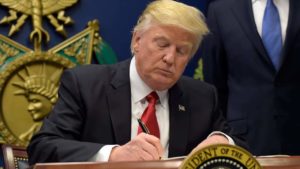 Although at the present moment President Trump’s travel ban has been temporarily stayed by a Seattle judge, the future of the executive order that shuts the door on immigrants from seven Muslim-majority countries is still uncertain. And whether the White House backs away from the ban (which is unlikely, based on reactions about the stay from the president and representatives, and also in light of the recent firing of acting Attorney General Sally Yates when she refused to stand behind the order), the healthcare field has already been directly impacted by it.
Although at the present moment President Trump’s travel ban has been temporarily stayed by a Seattle judge, the future of the executive order that shuts the door on immigrants from seven Muslim-majority countries is still uncertain. And whether the White House backs away from the ban (which is unlikely, based on reactions about the stay from the president and representatives, and also in light of the recent firing of acting Attorney General Sally Yates when she refused to stand behind the order), the healthcare field has already been directly impacted by it.
The U.S. has traditionally been home to non-citizens who legally enter the country in order to obtain training and find work in the healthcare industry. So what does the immigration ban mean to the organizations that depend on these professionals?
Uncertainty and confusion for visa-holders
Some highlights of how the immigration ban has intersected with the healthcare sector:
A Massachusetts General Hospital spokesperson said that five staff members had been impacted by the travel ban. Some visa-holders were not permitted to board a plane to the U.S., and others had applications for visas still in the system.
The Cleveland Clinic reported that three of its doctors felt the effects of Trump’s executive order. Two were detained but eventually allowed to enter the country, but first-year resident Dr. Suha Abushamma was forced to board a plane to Saudi Arabia because she has a passport from Sudan.
In a statement released by the Cleveland Clinic, she wrote: “Although this has been a difficult experience, I am grateful to be safe with my family in Saudi Arabia. Please know that I am deeply committed to my medical career and to helping patients at Cleveland Clinic.”
Ann Nickels is a spokesperson for MedStar Health, which is a hospital system that serves the Baltimore-D.C. area and includes 10 facilities. Although she told reporters at Modern Healthcare that she wasn’t able to give specifics about members of MedStar staff whose travel the ban had restricted, she noted that the organization employed “a number” of individuals with “international backgrounds,” and some of them hail from one of the seven banned countries.
Adhering to its protocol for visa sponsorship, “MedStar is providing support for these associates and their families,” Nickels said.
A minimum of 15,000 physicians come from countries on the ban-list
According to Jim Stone, president of the Medicus Firm (a doctor-staffing agency), there are approximately 15,000 working physicians in the U.S. whose home countries are on the ban-list. However, that number only tells part of the story: there are individuals not born in one of the seven countries but that hold passports from those targeted areas that would drive that statistic upward.
“As a percentage of 800,000 doctors in the United States that’s not an insignificant percentage,” Stone said. “Considering the shortage of physicians already, anything that’s being done that decreases the supply of physicians is going to be a bad thing for healthcare.”
What about the U.S.’s reputation on the global healthcare stage going forward?
Dr. Darrell Kirch is president and CEO of the Association of American Medical Colleges. “I fear this is having a chilling effect on the view that physicians and medical scientists have of the U.S. as a welcoming place where excellence in healthcare is recognized and rewarded,” he said.
Kirch’s estimates put the number of non-U.S. citizens with ties to one of the seven countries in question who have applied for medical residency or fellowship positions this year at 1,000. “These people have been put into limbo,” he said.
Kirch is not alone in voicing concern about how the Trump administration’s attitude toward immigration in general, and from Muslim-majority countries in particular, might effect healthcare in the U.S., not only immediately, but long-term. Ultimately, if medical researchers and professionals born outside the U.S. feel discouraged from training or working in the country, the U.S. will arguably feel the biggest loss.
Sally Yates is not the only one digging in her heels. Some healthcare leaders have followed suit in their own way. For example:
Montefiore Health System is an academic medical center with hospitals and clinics in New York’s Bronx borough. Many of its patients are low-income, and the area itself is home to an estimated 117,000 undocumented individuals.
Montefiore CEO and President, Dr. Steven Safyer, sent a letter to members of the Montefiore community that made clear his determination not to share details about the immigration status of its students, patients, or staff “without appropriate legal proceedings.” He also stated that the company would not “contact or question anyone on the basis of immigration status or to discover their immigration status, except as legally required.”
MORE ABOUT THE BOOK: From Obamacare to Trumpcare…Why You Should Care
For more information/questions regarding any legal matters, please email [email protected] or call 310.203.2800.